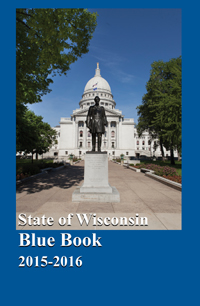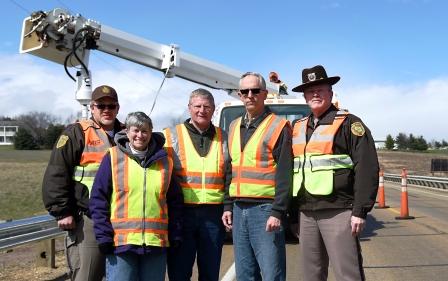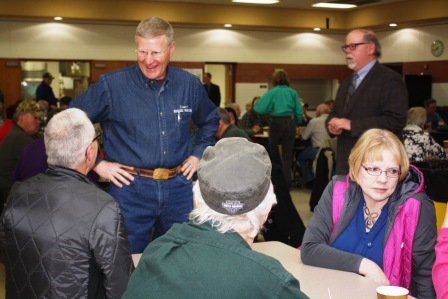|
|
||||||||||||||||||||||||||||||||
|
4/15/2016
|
|
|
|
|||||||||||||||||||||||||||||
|
Rebounding After a Raid When I was first elected to office, Wisconsin was feeling the effects of a
fiscal emergency. By June 30, 2011, the state had a $3 billion deficit in its
general fund when calculated using generally accepted accounting principless.
Large general fund deficits were backfilled by taking money from segregated
funds, such as the transportation fund and the patient’s compensation fund, which
were meant for specific purposes. Injured Patients Compensation Fund Balance
*Source: Legislative Fiscal Bureau |
||||||||||||||||||||||||||||||||
|
This week was National Work Zone Awareness Week and I was invited to visit
with Green County officials and to share their message to remind drivers to
drive safely in work zones this construction season. With the snow ending (hopefully) and temperatures warming, we have begun seeing more orange cones and workers in reflective gear on roadways throughout the state. In 2013, the most recent year in which data is available, the Wisconsin Department of Transportation reported that there were nearly 1,600 work zone crashes in Wisconsin. Approximately 629 people were injured and nine people were killed in these crashes! In 2015, there were three tragedies in which Wisconsin County Highway workers were killed in work zones. According to Green County Highway Commissioner Jeff Wunschel, most crashes in work zones occur when drivers speed through a work zone, do not pay attention to changing road conditions, run into other vehicles or highway equipment, or drive off the road completely. "By following the rules of the road in work zones, we can keep people safe during National Work Zone Awareness Week and all year long. Please remember that our road workers are performing their duties in order to provide for a safe and efficient transportation system. They are community members, spouses, parents, and friends within our County and deserve to go home safe every night," Wunschel said. There are specific laws that are designed to protect road construction workers: Cell Phones Banned in Work Zones - this past session, legislators approved a bill that imposes a $20 to $40 fine for drivers talking on handheld cell phones in construction zones, with the fine increasing to $50 to $100 for subsequent offenses within a year. Move Over, Slow Down - requires drivers to shift lanes or slow down in order to provide a safety zone for a squad car, ambulance, fire truck, tow truck, utility vehicle or highway maintenance vehicle that is stopped on the side of the road with it's warning lights flashing. Fines Double - fines are typically doubled, and motorists face felony charges if a collision results in great bodily harm in construction zones. Headlights On - Wipers On - the legislature also passed a bill I authored that requires drivers to turn on headlights when weather conditions limit visibility. The Wisconsin State Patrol said limited visibility means you can't see something 500-ft away, which is a little less than two high school football fields. State patrol said they've always recommended using headlights in poor conditions to keep everyone on the road safe. A ticket could cost $160. Photo above courtesy of the Monroe Times: Green County Sheriffs Deputy David Tschudy, Sen. Janis Ringhand (D-Evansville), Sen. Howard Marklein, Green County Highway Commissioner Jeff Wunschel and Green County Sheriff Mark Rohloff recognized National Work Zone Awareness Week with a tour. |
||||||||||||||||||||||||||||||||
|
Broadband Expansion Grant Workshops Announced The Public Service Commission (PSC) announced that it is now accepting
applications for Broadband Expansion Grants for Fiscal Year 2017.
Applications are due June 16, 2016. Application instructions and additional
materials may be found at http://psc.wi.gov/utilityinfo/tele/broadband/grants/bbGrantApplicationPage.htm
in recent years, we have had no applications filed for the broadband expansion grants. In Southwest Wisconsin, we certainly have a need for expanded broadband. It is my hope that some of our communities will be in a position to apply in this funding cycle. They will take place at the following locations in the 17th Senate District: Wednesday, April 20, 2016 |
||||||||||||||||||||||||||||||||
|
In The 17th Senate District
Rep. Todd Novak and Sen. Marklein presented a legislative citation to Eagle Scout Kyle Thompson in Darlington on April 3, 2016. Congratulations to Kyle on this great achievement!
Sen. Marklein attended the Richland Electrical Co-op Annual Meeting on Saturday, April 2, 2016.
Rep. Ed Brooks and Sen. Marklein spent the day touring the Reedsburg area with Lt. Governor Rebecca Kleefisch on April 7, 2016.
We met with Bob Van Meeteren at the Reedsburg Area Medical Center, visited the Ruminant at Harvest Park in Reedsburg, toured Seats Inc. with company President, Eric Sauey, and met with Pam Coy, General Manager of Viking Village Foods.
|
||||||||||||||||||||||||||||||||
|
In The Capitol
St. Clement School from Lancaster visited the State Capitol on Monday, April 11, 2016. |
||||||||||||||||||||||||||||||||
|
Useful Information County Health Rankings The County Health Rankings & Roadmaps program brings actionable data and strategies to communities to make it easier for people to be healthy in their homes, schools, workplaces, and neighborhoods. Ranking the health of nearly every county in the nation, the County Health Rankings illustrate what we know when it comes to what is making people sick or healthy. The Roadmaps show what we can do to create healthier places to live, learn, work, and play. The Robert Wood Johnson Foundation (RWJF) collaborates with the University of Wisconsin Population Health Institute (UWPHI) to bring this program to cities, counties, and states across the nation. View the full report on the County Health Rankings website.
County Health Rankings for the 17th Senate District
*Health Outcomes are based on an equal weighting of length and quality of life. **Health Factors are based on health behaviors, clinical care, social and economic factors, and the physical environment. |
||||||||||||||||||||||||||||||||
|
|
||||||||||||||||||||||||||||||||
|
Senator Howard Marklein is pleased to
provide this legislative E-Update for the constituents of the 17th State
Senate District. Please feel free to share this update with other interested citizens
and taxpayers. You are receiving this update because you have either
subscribed or contacted Senator Marklein directly. State Capitol - Room 8 South - Post Office Box 7882 - Madison, Wisconsin 53707 - Phone: (608) 266-0703 |
||||||||||||||||||||||||||||||||









